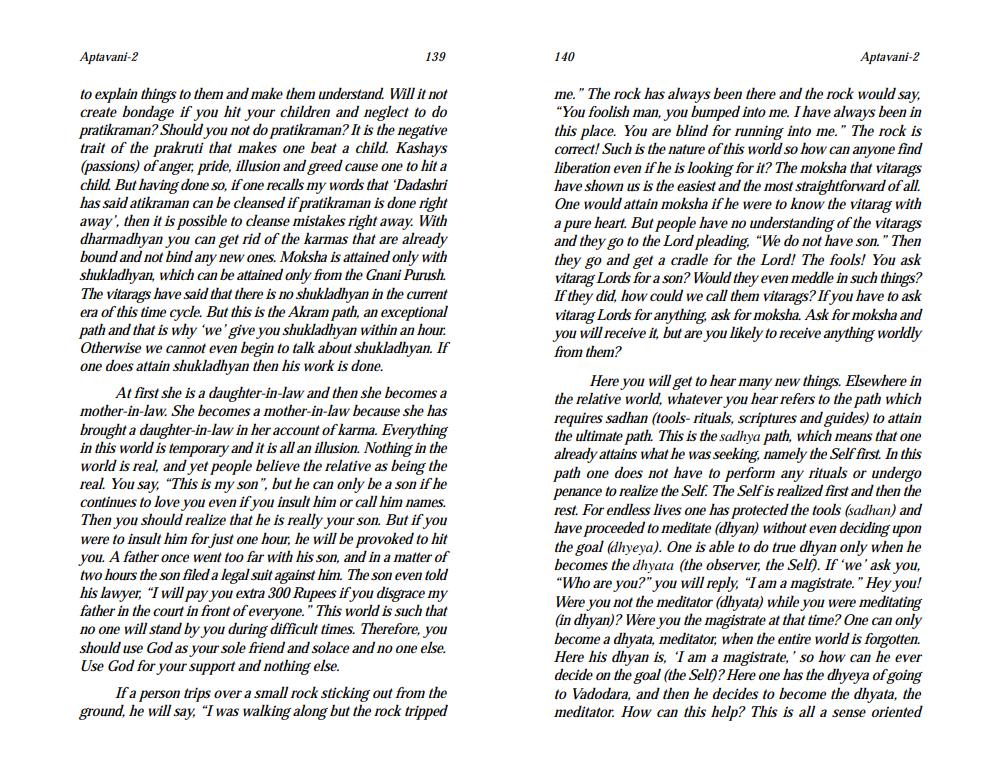________________
Aptavani-2
139
140
Aptavani-2
to explain things to them and make them understand. Will it not create bondage if you hit your children and neglect to do pratikraman? Should you not do pratikraman? It is the negative trait of the prakruti that makes one beat a child. Kashays (passions) of anger, pride, illusion and greed cause one to hit a child. But having done so, if one recalls my words that Dadashri has said atikraman can be cleansed if pratikraman is done right away, then it is possible to cleanse mistakes right away. With dharmadhyan you can get rid of the karmas that are already bound and not bind any new ones. Moksha is attained only with shukladhyan, which can be attained only from the Gnani Purush. The vitarags have said that there is no shukladhyan in the current era of this time cycle. But this is the Akram path, an exceptional path and that is why we give you shukladhyan within an hour. Otherwise we cannot even begin to talk about shukladhyan. If one does attain shukladhyan then his work is done.
At first she is a daughter-in-law and then she becomes a mother-in-law. She becomes a mother-in-law because she has brought a daughter-in-law in her account of karma. Everything in this world is temporary and it is all an illusion. Nothing in the world is real, and yet people believe the relative as being the real. You say, "This is my son", but he can only be a son if he continues to love you even if you insult him or call him names. Then you should realize that he is really your son. But if you were to insult him for just one hour, he will be provoked to hit you. A father once went too far with his son, and in a matter of two hours the son filed a legal suit against him. The son even told his lawyer, "I will pay you extra 300 Rupees if you disgrace my father in the court in front of everyone." This world is such that no one will stand by you during difficult times. Therefore, you should use God as your sole friend and solace and no one else. Use God for your support and nothing else.
If a person trips over a small rock sticking out from the ground, he will say, "I was walking along but the rock tripped
me." The rock has always been there and the rock would say, "You foolish man, you bumped into me. I have always been in this place. You are blind for running into me." The rock is correct! Such is the nature of this world so how can anyone find liberation even if he is looking for it? The moksha that vitarags have shown us is the easiest and the most straightforward of all. One would attain moksha if he were to know the vitarag with a pure heart. But people have no understanding of the vitarags and they go to the Lord pleading, "We do not have son." Then they go and get a cradle for the Lord! The fools! You ask Vitarag Lords for a son? Would they even meddle in such things? If they did, how could we call them vitarags? If you have to ask vitarag Lords for anything, ask for moksha. Ask for moksha and you will receive it, but are you likely to receive anything worldly from them?
Here you will get to hear many new things. Elsewhere in the relative world, whatever you hear refers to the path which requires sadhan (tools-rituals, scriptures and guides) to attain the ultimate path. This is the sadhya path, which means that one already attains what he was seeking, namely the Self first. In this path one does not have to perform any rituals or undergo penance to realize the Self. The Self is realized first and then the rest. For endless lives one has protected the tools (sadhan) and have proceeded to meditate (dhyan) without even deciding upon the goal (dhyeya). One is able to do true dhyan only when he becomes the dhyata (the observer, the Self). If 'we' ask you, "Who are you?" you will reply, "I am a magistrate." Hey you! Were you not the meditator (dhyata) while you were meditating (in dhyan)? Were you the magistrate at that time? One can only become a dhyata, meditator, when the entire world is forgotten. Here his dhyan is, 'I am a magistrate,' so how can he ever decide on the goal (the Self)? Here one has the dhyeya of going to Vadodara, and then he decides to become the dhyata, the meditator. How can this help? This is all a sense oriented




